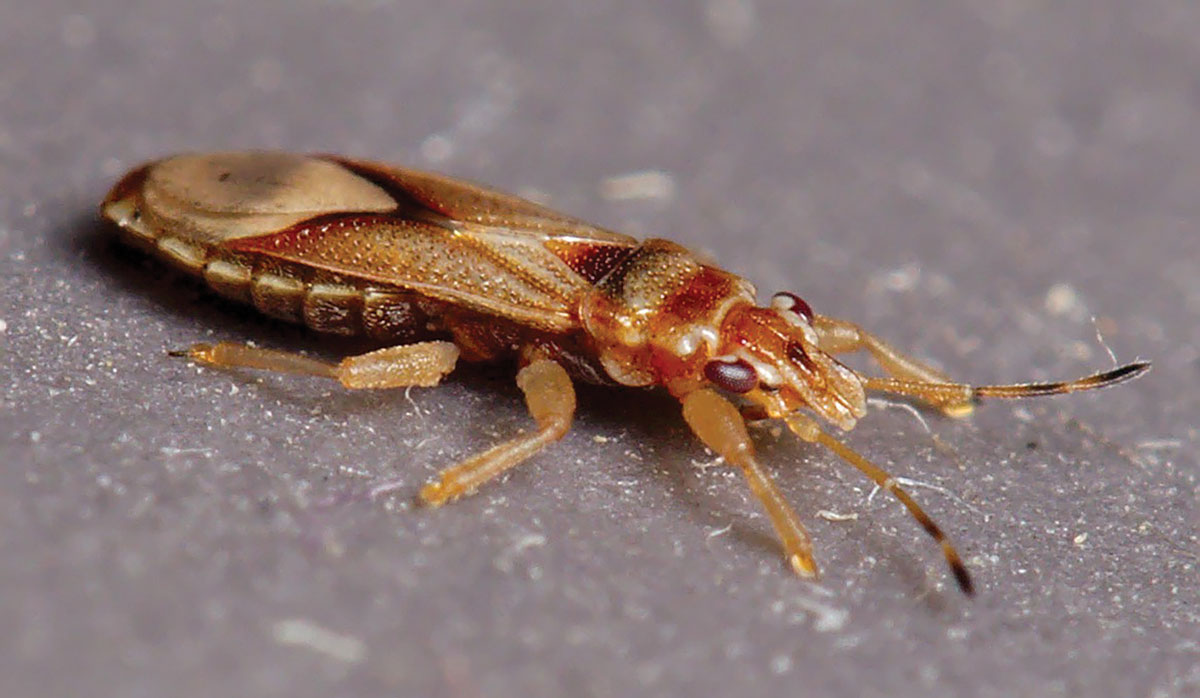NZ winegrowers advance vineyard biosecurity in 2025
The year was marked by “progress, collaboration and reflection” in biosecurity, says New Zealand Winegrowers Biosecurity Advisor Jim Herdman.
Every year, the New Zealand Winegrowers biosecurity team is sent an increasing number of images from members of suspected grapevine pest insects and disease symptoms, evidence that a high level of biosecurity awareness is building amongst the industry.
As well as focusing on the vines themselves, New Zealand Winegrowers (NZW) encourages members to be aware of the wider vineyard surroundings and any changes that may be taking place; a new pest or disease establishing on non-grapevine vineyard plantings or surrounds could also negatively impact vineyard operations.
Bronze Bug in Marlborough
Earlier this year, Thaumastocoris peregrinus, also known as the ‘bronze bug’ (not to be confused with the bronze beetle, Eucolaspis brunnea) was found in Marlborough. A defoliating pest of eucalyptus, the bronze bug was first detected in Auckland in 2012 during routine biosecurity surveillance undertaken by the Ministry of Agriculture and Fisheries. Further surveillance revealed it was likely already widespread in the Auckland area, and eradication attempts were likely to be futile, given the spread and a lack of effective tools. A decade later, it is widespread on eucalyptus in Marlborough, and the Marlborough District Council (MDC) has already had to undertake tree removal in some areas. The bug reproduces relatively quickly, and adults and nymphs can be found on eucalyptus leaves in large numbers. Their feeding turns the leaves from silver in colour to a rusty red. In severe infestations, branch dieback occurs, and severe defoliation over several years can lead to tree death. Populations could grow particularly large during the upcoming summer – bronze bug tend to do well when it’s warmer and are likely to thrive in the forecast El Niño/drought conditions this summer, while eucalyptus trees will be water stressed and less able to cope with bronze bug infestation.
Eucalyptus trees are common across Marlborough’s rural landscape and are often found around vineyards. MDC are not planning to undertake any pest control, as the bug is already widespread and well established, and good control tools are not readily available. However, cases like this highlight that it’s not just grapevine pests that could cause biosecurity issues for vineyards. If a chemical treatment programme had been put in place, for example, there could have been residue implications for nearby vines and disruption to day-to-day vineyard operations while eucalyptus spraying was carried out.
Foot and mouth disease could also impact vineyards
Sustainable Winegrowing New Zealand (SWNZ) questionnaires show that almost 50% of New Zealand vineyards use sheep at some stage in the year, for winter grazing or leaf plucking in the summer. With the recent outbreak of foot and mouth disease (FMD) in Indonesia, and Australia on high alert, NZW members grazing sheep in vineyards are advised to be aware of the signs and symptoms of the disease, which affects all cloven-hooved animals. Symptoms of FMD can include depression, fever, blisters or lesions around the hooves or muzzle, lameness, drooling, difficulty eating, and sudden death of young animals. The disease is less obvious in sheep and goats but often causes small blisters just above the hooves.
Should FMD be confirmed in New Zealand, the Prime Minister will declare a National Biosecurity Emergency, and the Ministry for Primary Industries would initiate a national livestock standstill as part of the FMD Response Plan, to help find, contain and control the disease. This means all movement of susceptible animals must stop as quickly as possible.
If a livestock standstill were to occur while sheep and other stock were grazing in vineyards, they are likely only to be allowed to be moved if it is a low-risk movement and a permit has been obtained. Animal welfare would need to be monitored, and the availability and delivery of additional feed would need to be planned for during a standstill period. If livestock in a vineyard were found to be infected with FMD, the animals would need to be culled and disposed of under the direction of MPI officials. Additional hygiene measures or movement controls may be required for any machinery, equipment, vehicles, and people moving on or off-site.
 |
|---|
|
The bronze bug is a defoliating pest of eucalyptus |
NZW has produced a factsheet for vineyards grazing stock with more detail about FMD, which can be accessed on the nzwine.com website, or requested by emailing us.
If you see anything unusual, remember to catch it, snap it (take a photo), and report it to the Biosecurity NZ hotline on 0800 80 99 66, and email it to the NZW biosecurity team (This email address is being protected from spambots. You need JavaScript enabled to view it.).
Early Detection the Best Chance of Eradication
The earlier a new pest or disease is detected, the less opportunity it has to build up a damaging population level and spread around the country, and the more likely an eradication response will be successful. While the vines themselves are a key area of focus, other plants or animals in and around vineyards can also be affected by biosecurity issues, which can indirectly impact vineyard operations. Some actions that all members should consider making part of day-to-day operations for vineyards and wineries are as follows:

Trade is important to our industry, whether it’s because 90% of our wine sales are in international markets, because of…

The end of the year is fast approaching, so here are some thoughts on a few of the significant developments…
Jimmy Stewart is quite literally chipping away at circularity.
A Wine Marlborough Lifetime Achievement Award is “very premature”, say Kevin and Kimberley Judd, nearly 43 years after they came…
Wine tourism has evolved into a sophisticated, diverse and resilient part of the New Zealand wine sector's economy. Emma Jenkins MW talks…